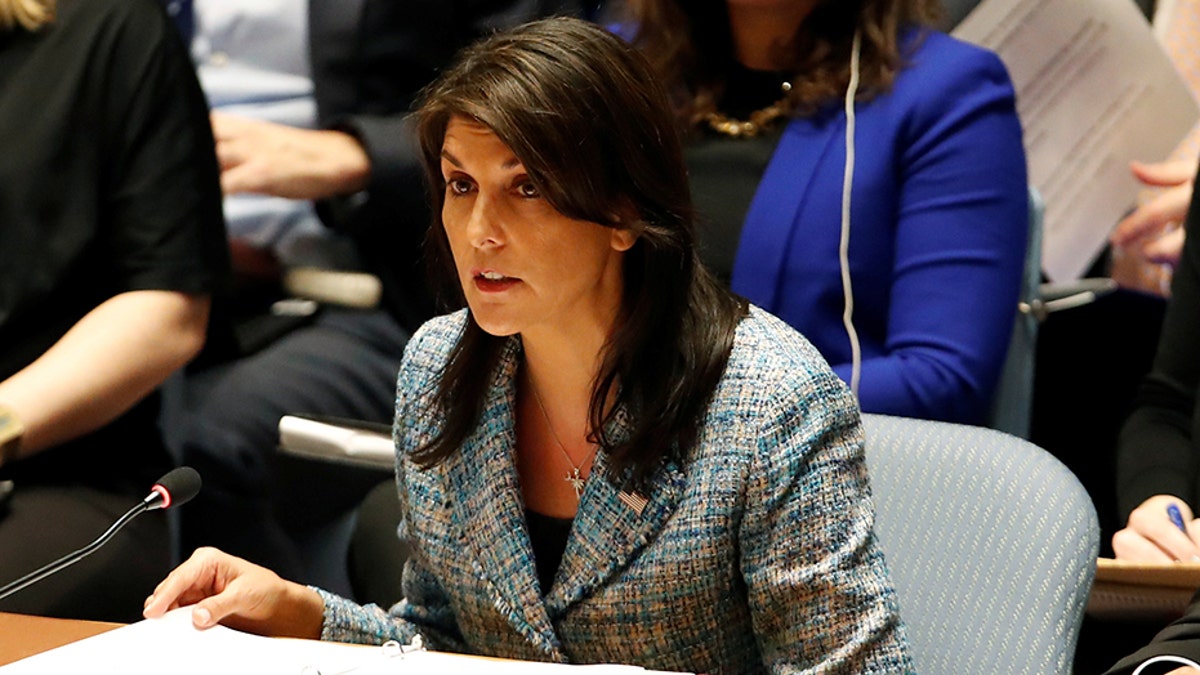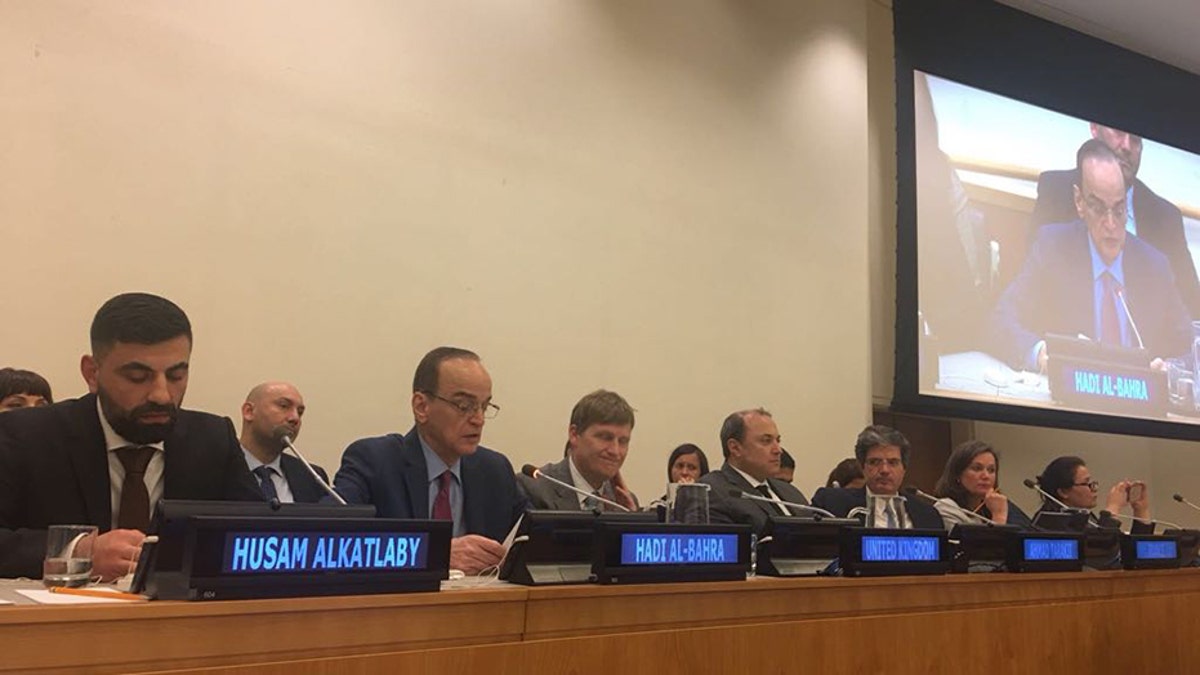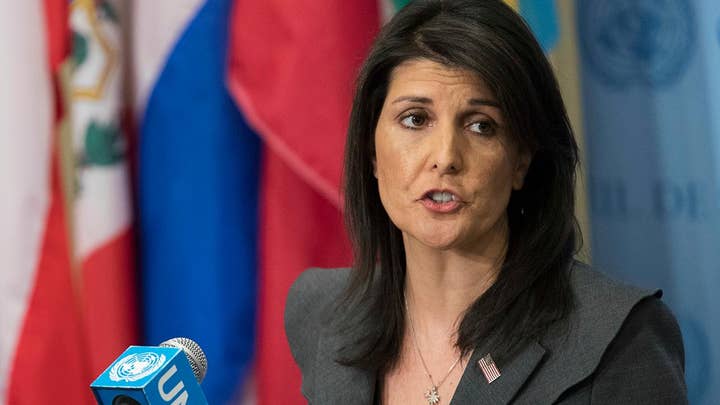
United States Ambassador to the United Nations Nikki Haley addresses the U.N. Security Council on Syria during a meeting of the Council at U.N. headquarters in New York, U.S., March 12, 2018. REUTERS/Mike Segar - RC1A0BA8FB40
Addressing the United Nations Security Council Monday, Nikki Haley, the United States ambassador to the world body, warned that the U.S. could act in the face of more chemical attacks.
Haley’s remarks to the Security Council came at a briefing on the implementation of Security Council Resolution 2401 regarding the Syrian humanitarian ceasefire.
Secretary General António Guterres bluntly told the council that, “there has been no cessation of hostilities.”
Haley reminded council members of the Trump administration’s response against the Assad regime following its failure to act when it used sarin gas in a chemical attack against civilians in the town of Khan Shaykhun. That sarin gas attack by the Assad regime resulted in nearly 60 deaths of innocent civilians, including children. President Trump ordered a strike on an the Shayrat airbase. Dozens of Tomahawk missiles targeted that base.
Haley’s speech was the second senior voice from the Trump administration in a week where the topic of an administration response to Syria’s continued use of chemical weapons was raised. Last Tuesday the Director of National Intelligence, Dan Coats, told the Senate Armed Service Committee hearing a response was “something that needs to be discussed.”
During Monday’s Security Council meeting the U.S. ambassador also took aim at Russia. Haley said that the Russians had not kept its commitment for endorsing the resolution in which it “negotiated the wording of the ceasefire, down to the commas and the periods.”
Haley noted that in the first four days following the ceasefire, the Russians had conducted some 20 bombing sorties in Damascus and Eastern Ghouta.
Haley told members: “This is no ceasefire. This is the Assad regime, Iran, and Russia continuing to wage war against their political opponents. And there’s another reason we know the Syrians and Russians never intended to implement the ceasefire.”
Haley outlined a new draft resolution that if passed by the council would take place immediately. She said that it contained no loopholes for the Russians, Iran and Assad to hide from.
Vassily Nebenzia, Russia’s ambassador to the Security Council, defended his country’s efforts to support the humanitarian ceasefire, blaming the disruption on terrorists who he said are breaking it: “The suburbs of Damascus cannot remain a hotbed of terrorism. And it is continued attempts of terrorism to undermine the cessation of hostilities of the regime that is the reason why the highly tense situation in Syria continues.”
Britain’s Deputy U.N. Ambassador Jonathan Allen said the resolution had so far failed.
He said, “Our resolution was clear: ceasefire without delay, humanitarian access, medical evacuation. None have happened. Instead the truth is that the regime will continue to pound Eastern Ghouta until they have a complete military victory there. And that Russia will continue to protect its ally whatever the cost to the people of Syria and to its own reputation.”
At an informal meeting of the Security Council Monday afternoon hosted by the U.K., France, Poland and the Netherlands, members of the Syrian opposition discussed the implementation of the ceasefire.
Hadi al-Bahra, a senior member of the main Syrian opposition, described to Security Council members what life was like for ordinary Syrians: “Those that make it through one day alive must face the very real prospect of death the very following day.”

Hadi al-Bahra, who is a senior member of the negotiating team for the Syrian opposition, addresses an informal U.N. Security Council meeting Monday about what life was like for ordinary Syrians. (Syrian American Council)
Al-Bahra, who is a senior member of the negotiating team for the Syrian opposition, likened the Assad regime’s policies to that of an abuser who is never punished.
He warned that “Assad continues and escalates safe in the knowledge that his military strategy is his best option.”
He said the latest front where this is happening is Eastern Ghouta, and that with the support of Russia, Iran and Hezbollah, Assad’s military solution is only reinforced.
Nivin Hotary, a 38-year-old mother, via a video link from Eastern Ghouta, told the meeting what living under siege was like. Hotary said she has been forced to live in an underground silo that was moldy and had no water or proper toilets. She said they were not fit for humans to live in.
Hotary said, “I am forced to be here because the Assad-Russian forces are bombing us daily, even throughout the hours of the truce.”
Hotary urged the Security Council to act without delay for an immediate implementation of the ceasefire and an end of the siege, as “every minute is an opportunity of more killing.”





















